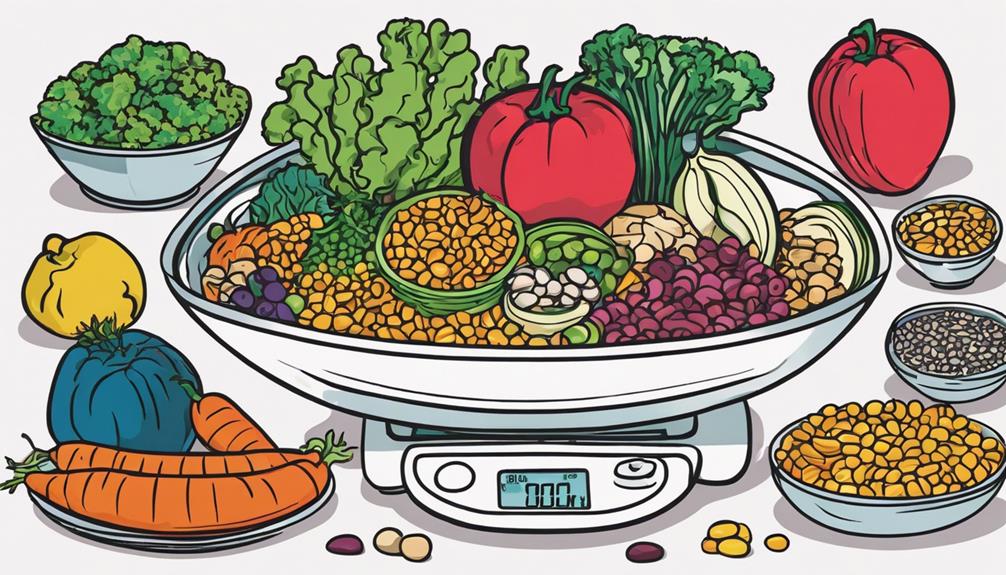When navigating the intricate web of managing diabetes, envision your meals as pieces of a complex puzzle, each one playing a crucial role in maintaining stable blood sugar levels. How you assemble these pieces can greatly impact your health journey.
By unraveling the secrets of balanced meals, mastering portion control, embracing fiber-rich options, investing in meal prep techniques, and adopting mindful eating practices, you are laying the groundwork for optimal diabetes control.
Stay tuned to discover how these meal planning strategies can revolutionize your approach to managing diabetes.
Key Takeaways
- Balanced meals with nutrient timing stabilize blood sugar levels.
- Portion control aids in regulating blood sugar and weight.
- Fiber-rich foods support stable blood sugar and overall health.
- Meal prep and batch cooking streamline efficient diabetes management.
Importance of Balanced Meals

To effectively manage your diabetes, ensuring your meals are balanced with the right mix of nutrients is crucial. Nutrient timing plays a key role in stabilizing blood sugar levels and preventing spikes. Understanding the glycemic index of foods can help you make informed choices about carbohydrate sources. Foods with a low glycemic index release glucose more slowly into the bloodstream, aiding in better blood sugar control. Incorporating complex carbohydrates such as whole grains, legumes, and vegetables can help sustain energy levels throughout the day without causing rapid spikes in blood sugar.
When planning your meals, aim to include a variety of nutrient-dense foods from all food groups. Focus on lean proteins, healthy fats, high-fiber carbohydrates, and a colorful array of fruits and vegetables. Distributing your carbohydrate intake evenly throughout the day can also help in managing blood sugar levels effectively. Remember, balance and moderation are key in creating meals that support your overall health and diabetes management goals.
Portion Control Tips
Balancing your meal portions is essential for effective diabetes management. Controlling portion sizes helps regulate blood sugar levels and manage weight, crucial aspects of diabetes care. When planning your meals, pay attention to serving sizes to ensure you're consuming appropriate amounts of food. Opt for nutrient-dense options like vegetables, lean proteins, and whole grains to make healthy choices that support your diabetes control. Be mindful of portion distortion, where oversized servings become the norm, leading to excess calorie intake.
To practice portion control, use smaller plates to naturally limit portion sizes and avoid overeating. Fill half your plate with non-starchy vegetables, a quarter with lean protein, and the remaining quarter with whole grains or starchy vegetables. This simple visual guide can help you create balanced meals without the need for complicated measurements. Additionally, listen to your body's hunger and fullness cues to prevent overindulging. By focusing on serving size and making healthy choices, you can effectively manage your diabetes and improve your overall health.
Incorporating Fiber-Rich Foods

Incorporating fiber-rich foods into your daily meals is crucial for promoting stable blood sugar levels and supporting overall health in diabetes management. Fiber plays a significant role in managing blood glucose levels by slowing down the absorption of sugar, which can help prevent spikes in blood sugar. Additionally, it aids in digestion, promotes a feeling of fullness, and supports heart health.
- High fiber snacks: Opt for snacks like raw vegetables with hummus, a small handful of nuts, or fresh fruits to increase your daily fiber intake while keeping hunger at bay.
- Fiber supplements: Adding a fiber supplement to your routine can help you reach your daily fiber goals, but it's essential to consult with your healthcare provider before incorporating them into your diet to ensure they're suitable for you.
- Explore different sources: Include a variety of fiber-rich foods in your meals such as whole grains, legumes, fruits, and vegetables to benefit from a range of nutrients and keep your meals exciting.
Meal Prep and Batch Cooking
For efficient diabetes management, consider streamlining your meal preparation by embracing meal prep and batch cooking techniques. These strategies not only save time but also allow for better control over your dietary choices. By dedicating a few hours each week to preparing meals in advance, you can ensure that you have healthy options readily available, reducing the temptation to reach for convenient but less nutritious alternatives.
Batch cooking involves preparing larger quantities of food that can be portioned out and stored for later consumption. This method not only helps with time management but also ensures that you have a variety of meals to choose from throughout the week. It allows you to try out different recipes without having to cook every day, providing you with a diverse range of flavors and nutrients.
Mindful Eating Practices

To optimize your diabetes management, practicing mindful eating can significantly impact your overall health and blood sugar control. Mindful eating involves being present in the moment, paying attention to your food choices, and listening to your body's hunger and fullness cues.
Here are a few strategies to help you cultivate mindful eating habits:
- Mindful Snacking: Instead of mindlessly reaching for snacks, take a moment to consider if you're truly hungry or just craving something out of habit.
- Mindful Habits: Create a peaceful eating environment free from distractions like phones or TVs to focus on enjoying your meal and recognizing when you're satisfied.
- Mindful Portions: Use smaller plates and utensils to help control portion sizes and prevent overeating without feeling deprived.
Frequently Asked Questions
Can Intermittent Fasting Be a Beneficial Meal Planning Strategy for Diabetes Control?
Intermittent fasting can offer benefits for diabetes control through improved insulin sensitivity and weight management. However, consult with your healthcare provider to assess individual risks and determine if fasting aligns with your meal timing strategies.
Are There Any Specific Cooking Methods That Can Help Retain Nutrients in Diabetic-Friendly Meals?
When cooking diabetic-friendly meals, utilizing methods like steaming or stir-frying can help retain vital nutrients. These techniques preserve the goodness of ingredients, ensuring your meals are both healthy and delicious.
How Can Individuals With Diabetes Navigate Social Gatherings and Dining Out While Still Sticking to Their Meal Plans?
When navigating social gatherings and dining out with diabetes, remember to plan ahead. Choose restaurants with healthier options, watch portion sizes, and communicate your dietary needs. Stay mindful of carb intake and make smart choices while enjoying social events.
Are There Any Specific Supplements or Vitamins That Are Recommended for Individuals With Diabetes to Incorporate Into Their Meal Planning?
You may wonder if supplements are truly necessary for diabetes management. While they can complement a balanced diet, focus on nutrient-rich foods first. Some recommended supplements include vitamin D, magnesium, and omega-3 fatty acids to support overall health.
How Can Individuals With Diabetes Adjust Their Meal Plans to Accommodate Physical Activity or Changes in Their Exercise Routine?
When adjusting your meal plans for physical activity, consider having a pre-workout snack like a banana or yogurt for energy. Stay hydrated before, during, and after exercise. These adjustments support your diabetes management and overall well-being.
Conclusion
In conclusion, meal planning is essential for optimal diabetes control. Did you know that incorporating fiber-rich foods in your meals can help lower blood sugar levels?
By focusing on balanced meals, portion control, and mindful eating practices, you can better manage your diabetes and improve your overall health. Remember to plan ahead, prep your meals, and make healthy choices to keep your blood sugar in check.
Stay proactive in managing your diabetes through smart meal planning strategies.